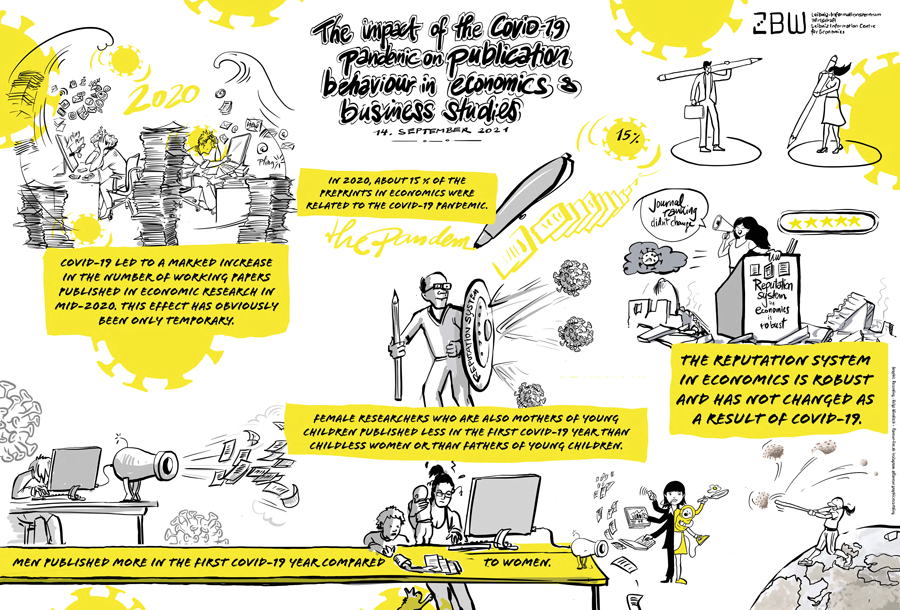
Publishing Behaviour in Economics: Coronavirus Pandemic Turns out to Be a Temporary Shock
Has publication behaviour in economics changed due to the COVID-19 pandemic? An international ZBW workshop has recently discussed first study results and especially on how different female and male researchers have been affected by the corona crisis.
by Olaf Siegert

COVID-19 has not only had an important influence on daily life, but also on our professional work as researchers and service providers. Trends towards increasing digitisation of the entire research process, in particular through remote conferences and meetings, have changed the dynamics of how research teams interact. Changes in publishing models were also driven by the unique shock of the pandemic to the scientific system. But are there differences regarding changes in publication behaviour in different research disciplines, e.g. in Economics and Business Studies?
Based on these questions the ZBW organised a virtual workshop to highlight recent studies that address and inves-tigate these changes in publication behaviour in response to COVID-19. So, in September 2021 more than 50 participants came together to engage in a productive exchange of ideas.
The seven presentations of the workshop were grouped in two thematic sessions followed by an open discussion with all attendees. The first session focused on general trends in the publishing behaviour of researchers in Economics and Business Studies. The second session was mainly con-cerned with gender disparities in publication behaviour, i.e. the differences in the productivity of women and men during the corona crisis and how these relate to differences in pressures experi-enced by women and men (e.g. childcare during lockdown). The effects of COVID-19 on the role of Social Media and Peer Review in scholarly publishing and its overall impact on the academic reputa-tion system were discussed with all workshop participants at the end of the meeting.
General trends in publishing behaviour during the corona crisis
The first session started with a presentation by Klaus Wohlrabe (ifo Institute Munich) on „The in-fluence of Covid19 on the publication behaviour in economics – Bibliometric evidence from five working paper series (PDF). In his paper Wohlrabe analyses, how the pandemic influenced the publication behav-iour in the area of Economics. He considered articles published in five working paper series (NBER, CEPR, IZA, CESifo and MPRA) to answer questions like: „In what areas of economics were COVID-19-related studies published?“ or „Do COVID-19 papers have been downloaded more often com-pared to other economics papers?“.
The second presenter was Nicholas Fraser (ZBW) with a presentation of his paper „Publishing of working papers during the COVID-19 pandemic: a survey of economics researchers“. He compared repositories from different disciplines (e.g. SSRN, RePEc, BioRxiv and medRxiv) to analyse the changes in publication behaviour, e.g. regarding publication output.
After that Emilia Di Lorenzo (University of Naples Federico II, Italy), Gabriella Piscopo (University of Naples Federico II, Italy) and Marilena Sibillo (University of Salerno, Italy) talked about their paper „Economics and Business Studies during the pandemic and beyond: new research trends“ (PDF). They focused on the developments of research in the field of insurance sciences, based on a bibliometric analysis of the Web of Science database.
The last presenter in the first session, Kristin Biesenbender (ZBW) showcased first results from her PhD study „Publication behaviour of German economists in the face of the Covid-19 pandemic“ based on EconBiz data. The possible effects of the COVID-19 pandemic on publication formats, internationalisation, co-authorship and Open Access were presented. The focus was on whether it makes a difference whether a researcher is at the beginning of her : his scientific career or already established.
Gender disparities in publication behaviour during the pandemic
The first presentation in the second half of the workshop came from four researchers from the University of Cambridge, namely Noriko Amano-Patiño, Elisa Faraglia, Chryssi Giannitsarou and Zeina Hasna on “The Unequal Effects of Covid-19 on Economists’ Research Productivity”. They used data mainly from the NBER and CEPR working paper series to explore the patterns of working paper publica-tions. Among other things, they found that gender differences are particularly stark at the mid-career level.
The second presenter was Tatyana Deryugina (University of Illinois, USA) on “Gender Disparities and Covid-19”. She discovered in her survey of academics across various disciplines that female and male academics experienced a substantial increase in time spent on childcare and housework and that the increase was even larger for women. This also led to a reduction of time available for research when compared to men and to women without children.

Illustration from the Workshop “The Impact of Covid-19”, Detail, Helge Windisch
Simone Chinetti from the University of Salerno (Italy) showcased his recent paper „Academic productivity and pandemic – evidence from female economists during the COVID-19 crisis“. He investigated how the current pandemic affects the productivity of female economists, including the sudden increase in domestic work and childcare to be done by women due to school closures and social distanc-ing measures. His data sample came from SSRN papers published between January and November 2020. He found a decline regarding the number of uploaded papers from female economists com-pared to their male counterparts.
Discussion on the change of publishing behaviour in times of a pandemic
The third session of the workshop was an open discussion among participants chaired by Isabella Peters (ZBW). They discussed the following topics:
- Are research results being shared more intensively via Social Media (e.g. Twitter) or via other online media (e.g. in blogs, news articles)?
- What is the mode and role of Peer Review when publishing in a pandemic? Are there expe-riences with other formats of Peer Review (e.g. Rapid Reviews, Open Peer Reviews, Open Review Reports)?
- How has the pandemic affected the scientific reputation system in Economics and Business Studies? What are positions and approaches from learned societies, universities or re-search funders?
To sum up, the workshop resulted in the following four core conclusions:
- COVID-19 has meanwhile led to a sharp increase in publication activity, which can be seen above all in the number of preprints published (mostly called “working papers” in Econom-ics). However, this was apparently a temporary effect, which was especially noticeable in spring / summer 2020 and has now subsided.
- The pandemic itself was a very strong topic in preprints in economics – around 15% of all publications that have been published since the beginning of the corona crisis also deal with it. Here, too, the effect was stronger in 2020 and is now slowly decreasing again. COVID-19-related papers were also used more, i.e. downloaded and cited.
- In relation to gender, a stronger publication activity was temporarily observed among men when compared to women. The slump among women was particularly evident in mothers of young children, who were particularly affected by lockdown and home schooling. Here, too, the effect now seems to be decreasing.
- With regard to the reputation system in Economics, COVID-19 does not seem to have any major effects. Above all, the pandemic has positively influenced the publication behaviour in the area of preprints – the importance of journal rankings and the submission behaviour in journals have changed little or not at all.
The detailed workshop programme including abstracts is available here.
This might also interest you:
- Has publication behaviour in economics changed due to the COVID-19 pandemic? International ZBW workshop discusses first study results (German).
- Open Economics Guide: New Open Science Support for Economics Researchers.
- Open Economics: Study on Open Science Principles and Practice in Economics .
- InnOAccess-Workshops: Publishing Free-of-Charge Open Access Journals Sustainably.
- Open Access Journals: Who Is Afraid of 404?
- One Year of Open Access: The journals Wirtschaftsdienst and Intereconomics Take Stock.
Olaf Siegert is head of the Publication Services department and Open Access Representative of the ZBW – Leibniz Information Centre for Economics. He is involved with open access as part of his work at the ZBW and is also active for the Leibniz Association, where he represents the Leibniz Open Access working group in external committees. He is involved in the Alliance of Science Organisations in the working group Scientific Publication System and at Science Europe for the Leibniz Association.
Portrait: ZBW©
View Comments

Science Checker: Open Access and Artificial Intelligence Help Verify Claims
The Science Checker is a tool that uses a broad Open Access database and artificial...



